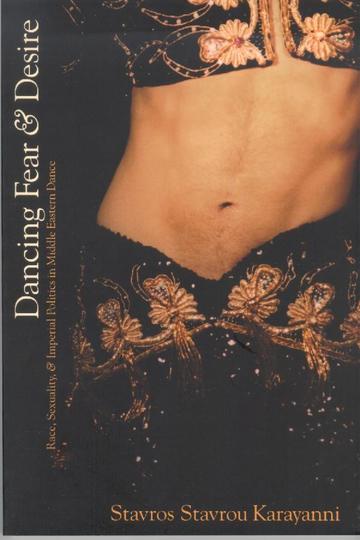Throughout centuries of European colonial domination, the bodies of Middle Eastern dancers, male and female, move sumptuously and seductively across the pages of Western travel journals, evoking desire and derision, admiration and disdain, allure and revulsion. This profound ambivalence forms the axis of an investigation into Middle Eastern dance—an investigation that extends to contemporary belly dance.
Stavros Stavrou Karayanni, through historical investigation, theoretical analysis, and personal reflection, explores how Middle Eastern dance actively engages race, sex, and national identity. Close readings of colonial travel narratives, an examination of Oscar Wilde’s Salome, and analyses of treatises about Greek dance, reveal the intricate ways in which this controversial dance has been shaped by Eurocentric models that define and control identity performance.
- Winner, European Society for the Study of English (ESSE) Book Award for Cultural Studies
''Dancing Fear and Desire bridges 'the discourse of postcolonial dance and queer theory.' Through its examination of 'the politics of dance--tsifteleli, belly dance [and] Oriental dance'--the book will appeal to serious students of the dance as cultural phenomenon.... An interesting mix of personal observations, subjective conclusions, and scholarly research, Karayanni's study advances our understanding of and appreciation for Middle Eastern dance forms.''
''To reduce Karayanni's complex work to brief description does it no justice. He examines the cultural politics of Middle Eastern dance in the nineteenth, twentieth, and early twenty-first centuries using historic images and descriptions combined with a narrative of his personal experience of Middle Eastern dance as a colonized Cypriot male homosexual. Thus the reviewer is presented with the challenge of describing the web of issues and re-presented events that necessarily surrounds autobiographical, neo-colonial, gender- and race-inflected perspectives on non-verbal art that has rarely been subject to any sort of analysis. The simplest statement I can make (as an ethnomusicologist specializing in the Middle East) is that this is probably the most satisfying work on the Middle East I have ever read.... [T]he approach is intellectually very strong.... With this work we have a fresh view of the complications of gender, imperialism, body, and art that challenge the still-present single-line judgement that many of us have been taught.''
''Dancing Fear and Desire...enables a much-needed, and curiously belated, conversation between postcolonial and queer studies. And it rediscovers the occulted tradition that associates critical body with critical mind. Stavros Stavrou brings genuine understanding and enormous commitment to cross-cultural scholarship, and to the exhilarating tradition of dance itself. This exuberant book gives whole new meaning to the discipline of navel-gazing.''



